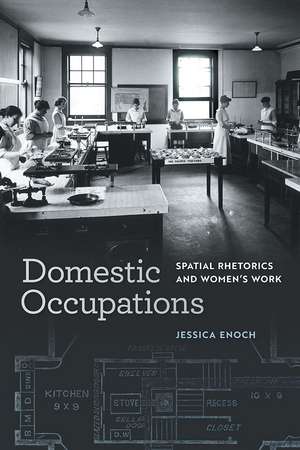Domestic Occupations: Spatial Rhetorics and Women’s Work: Studies in Rhetorics and Feminisms
Autor Jessica Enochen Limba Engleză Paperback – 11 sep 2019
This feminist rhetorical history explores women’s complex and changing relationship to the home and how that affected their entry into the workplace. Author Jessica Enoch examines the spatial rhetorics that defined the home in the mid- to late nineteenth and early twentieth centuries and considers how its construction and reconstruction—from discursive description to physical composition—has greatly shaped women’s efforts at taking on new kinds of work. In doing so, Enoch exposes the ways dominant discourses regarding women’s home life and work life—rhetorics that often assumed a white middle-class status—were complicated when differently raced, cultured, and classed women encountered them.
Enoch explores how three different groups of women workers—teachers, domestic scientists, and World War II factory employees—contended with the physical and ideological space of the home, examining how this everyday yet powerful space thwarted or enabled their financial and familial security as well as their intellectual engagements and work-related opportunities.
Domestic Occupations demonstrates a multimodal and multigenre research method for conducting spatio-rhetorical analysis that serves as a model for new kinds of thinking and new kinds of scholarship. This study adds historical depth and exigency to an important contemporary conversation in the public sphere about how women’s ties to the home inflect their access to work and professional advancement.
Enoch explores how three different groups of women workers—teachers, domestic scientists, and World War II factory employees—contended with the physical and ideological space of the home, examining how this everyday yet powerful space thwarted or enabled their financial and familial security as well as their intellectual engagements and work-related opportunities.
Domestic Occupations demonstrates a multimodal and multigenre research method for conducting spatio-rhetorical analysis that serves as a model for new kinds of thinking and new kinds of scholarship. This study adds historical depth and exigency to an important contemporary conversation in the public sphere about how women’s ties to the home inflect their access to work and professional advancement.
Preț: 257.13 lei
Nou
Puncte Express: 386
Preț estimativ în valută:
49.20€ • 51.50$ • 40.95£
49.20€ • 51.50$ • 40.95£
Carte indisponibilă temporar
Doresc să fiu notificat când acest titlu va fi disponibil:
Se trimite...
Preluare comenzi: 021 569.72.76
Specificații
ISBN-13: 9780809337163
ISBN-10: 0809337169
Pagini: 260
Ilustrații: 24
Dimensiuni: 152 x 229 x 23 mm
Greutate: 0.4 kg
Ediția:1st Edition
Editura: Southern Illinois University Press
Colecția Southern Illinois University Press
Seria Studies in Rhetorics and Feminisms
ISBN-10: 0809337169
Pagini: 260
Ilustrații: 24
Dimensiuni: 152 x 229 x 23 mm
Greutate: 0.4 kg
Ediția:1st Edition
Editura: Southern Illinois University Press
Colecția Southern Illinois University Press
Seria Studies in Rhetorics and Feminisms
Notă biografică
Jessica Enoch, associate professor of English at the University of Maryland, is the author of Refiguring Rhetorical Education: Women Teaching African American, Native American, and Chicano/a Students, 1865–1911 and a coeditor of both Burke in the Archives: Using the Past to Transform the Future of Burkean Studies and Mestiza Rhetorics: An Anthology of Mexicana Activism in the Spanish-Language Press, 1887-1922.
Recenzii
“As a feminist rhetoric project, Domestic Occupations is a smart, savvy book written by a scholar well grounded in traditional rhetorics and able to think outside that box.”—Krista Ratcliffe, coeditor of Rhetorics of Whiteness: Postracial Hauntings in Popular Culture, Social Media, and Education
“Enoch has unearthed a veritable treasure trove of archival and primary materials to demonstrate how networks of power animate the spaces that open up or close down opportunities for the women who inhabit them. This book will be taken up in graduate seminars across the country and will surely elicit a whole new generation of scholarship on women’s work and the spaces in which it occurs.”—Andrea Lunsford, author of EasyWriter
“Domestic Occupations offers rich insights for rhetorical scholars, feminist scholars, and anyone interested in spatial rhetorics and the feminization of professions. Offering meticulous archival research and several fascinating case studies, Enoch significantly pays close attention to the assumed whiteness and middle class of the discourse she analyzes.”—Gesa Kirsch, coauthor of Feminist Rhetorical Practices: New Horizons for Rhetoric, Composition, and Literacy Studies
“Enoch has unearthed a veritable treasure trove of archival and primary materials to demonstrate how networks of power animate the spaces that open up or close down opportunities for the women who inhabit them. This book will be taken up in graduate seminars across the country and will surely elicit a whole new generation of scholarship on women’s work and the spaces in which it occurs.”—Andrea Lunsford, author of EasyWriter
“Domestic Occupations offers rich insights for rhetorical scholars, feminist scholars, and anyone interested in spatial rhetorics and the feminization of professions. Offering meticulous archival research and several fascinating case studies, Enoch significantly pays close attention to the assumed whiteness and middle class of the discourse she analyzes.”—Gesa Kirsch, coauthor of Feminist Rhetorical Practices: New Horizons for Rhetoric, Composition, and Literacy Studies
Descriere
This feminist rhetorical history explores women’s complex and changing relationship to the home and how that affected their entry into the workplace. Author Jessica Enoch examines the spatial rhetorics that defined the home in the mid- to late nineteenth and early twentieth centuries and considers how its construction and reconstruction—from discursive description to physical composition—has greatly shaped women’s efforts at taking on new kinds of work. In doing so, Enoch exposes the ways dominant discourses regarding women’s home life and work life—rhetorics that often assumed a white middle-class status—were complicated when differently raced, cultured, and classed women encountered them.


![Appropriate[Ing] Dress: Women's Rhetorical Style in Nineteenth-Century America](https://i3.books-express.ro/bs/9780809324286/appropriate-ing-dress.jpg)










